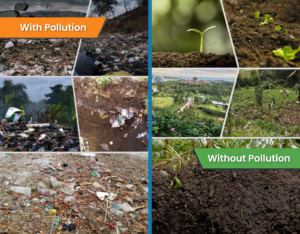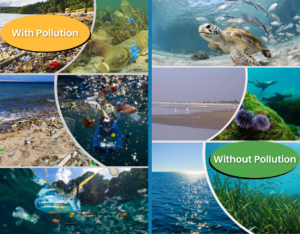Prevent Plastic Pollution
Every year, about 87,000 tonnes of single-use plastic are thrown away in Bangladesh that are mostly non-recyclable. Most single-use plastics used in Bangladesh are not disposed of properly, and so they end up in the lakes, rivers, or the ocean and disturbs aquatic life. On the other hand- in the breaking down process of recyclable plastics, they release different toxic chemicals and microplastics that eventually enter into our food chain and water supply. And nowadays, it has been found in our bloodstream.
Land based Plastic Pollution
 Very little of the plastic we discard every day is recycled or incinerated in waste-to-energy facilities. Much of it ends up in landfills, where it may take up to 1,000 years to decompose, leaching potentially toxic substances into the soil and water. Because of the ever-increasing use of plastic in different industries, especially packaging, Bangladesh remains one of the top plastic polluted countries. Besides blocking the topsoil, plastic also causes waterlogging in urban areas in Bangladesh. Every year major cities like Dhaka, Chattogram, Sylhet, etc. heavily flooded only because of plastic clogged in the drains and blocked the water flow in city areas. In the rural areas, because of blocking the soil to infiltrate water and other nutrients, the crop production rate is declining with time. Not only that, plastic leaches toxic chemicals and microplastic into the soil. Which later come to our food via the food chain and causes serious damage to our health.
Very little of the plastic we discard every day is recycled or incinerated in waste-to-energy facilities. Much of it ends up in landfills, where it may take up to 1,000 years to decompose, leaching potentially toxic substances into the soil and water. Because of the ever-increasing use of plastic in different industries, especially packaging, Bangladesh remains one of the top plastic polluted countries. Besides blocking the topsoil, plastic also causes waterlogging in urban areas in Bangladesh. Every year major cities like Dhaka, Chattogram, Sylhet, etc. heavily flooded only because of plastic clogged in the drains and blocked the water flow in city areas. In the rural areas, because of blocking the soil to infiltrate water and other nutrients, the crop production rate is declining with time. Not only that, plastic leaches toxic chemicals and microplastic into the soil. Which later come to our food via the food chain and causes serious damage to our health.
Marine Based Plastic Pollution
 Every year about 2 lakh tons of plastics enter the Bay of Bengal from Bangladesh. Bay is heavily littered with plastics and huge amounts of plastic waste are found on the shorelines, on the seabed, and suspended in the water column. Around 73,000 tonnes of plastic waste end up in the sea every day through the Padma, Jamuna and Meghna rivers. The corals of St. Martin Island are almost dead, littered with marine debris, plastic packages, and food wrap discarded by hundreds of tourists daily. The disintegrated plastic debris can potentially be ingested by the humans when they eat seafood, resulting in a number of fatal diseases including cancer. It is of the utmost importance to minimize plastic pollution. Microplastics, which are tiny pieces of plastic or fibres smaller than 5 mm, are even a more dangerous form of marine debris/litter. About 80 percent of marine litter is microplastics. Face wash, toothpaste, scrubs and anti-ageing creams contain thousands of microplastics per product. A single shower can result in 100,000 plastic particles entering the ocean.
Every year about 2 lakh tons of plastics enter the Bay of Bengal from Bangladesh. Bay is heavily littered with plastics and huge amounts of plastic waste are found on the shorelines, on the seabed, and suspended in the water column. Around 73,000 tonnes of plastic waste end up in the sea every day through the Padma, Jamuna and Meghna rivers. The corals of St. Martin Island are almost dead, littered with marine debris, plastic packages, and food wrap discarded by hundreds of tourists daily. The disintegrated plastic debris can potentially be ingested by the humans when they eat seafood, resulting in a number of fatal diseases including cancer. It is of the utmost importance to minimize plastic pollution. Microplastics, which are tiny pieces of plastic or fibres smaller than 5 mm, are even a more dangerous form of marine debris/litter. About 80 percent of marine litter is microplastics. Face wash, toothpaste, scrubs and anti-ageing creams contain thousands of microplastics per product. A single shower can result in 100,000 plastic particles entering the ocean.
So the best and only way to prevent plastic pollution is to ban the use of plastic made products. There are so many alternatives to plastic that we can use to protect our environment. For example, we can use cloth, paper or jute bag instead of polythene; metal, wooden or bamboo bottle; paper food wrapper; still or tin container and so on. So, go for a plastic free world and let’s promote the alternative. It should be you to protect your life and your environment.
